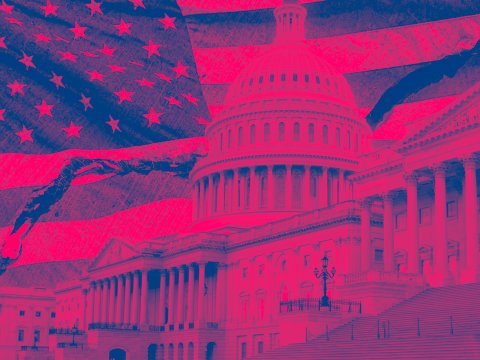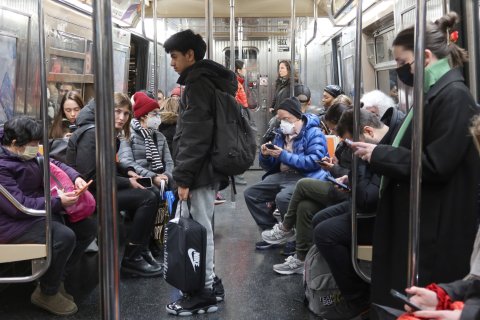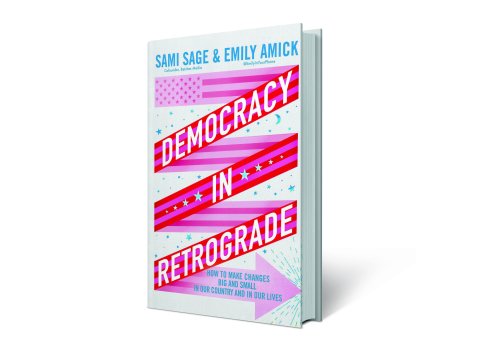Politics tamfitronics
By Sami Sage and Emily Amick
With only months to go before a redo of the 2020 presidential election, which offers two candidates many Americans are apathetic about, finding ways to reinvigorate civic engagement is essential. The national conversation often emphasizes how polarized society is, and how it’s just getting worse. The most extreme voices on opposite ends of the spectrum get the most attention. Yet—as authors Sami Sage, of Betches Media and the Morning Announcements podcast, and Emily Amick, creator of @EmilyinYourPhone and former counsel to Senate Majority Leader Chuck Schumer, discuss in their new book, Democracy in Retrograde(Gallery Books)—the vast majority of Americans are part of the exhausted majority. They’re just too tired of the contentious discourse and would rather avoid the fray. But, according to Sage and Amick in this excerpt from their book, despair and opting out is not the answer. Instead, the way to move beyond polarization is to engage actively with the people and institutions around us and participate in our own democracy, thereby improving it from the inside out.

In 2018, a group of researchers at an organization called More in Common launched a project called The Hidden Tribes of America to study polarization. They surveyed people about their core beliefs and basic values and, based on the data, identified seven distinct political groups in the U.S. The “tribes of America,” according to the report, are: progressive activists (8 percent), traditional liberals (11 percent), passive liberals (15 percent), politically disengaged (26 percent), moderates (15 percent), traditional conservatives (19 percent) and devoted conservatives (6 percent). But their most critical finding was that four out of the seven groups, which total 67 percent of Americans, fit within a broader category that they titled the “Exhausted Majority” whose views fall somewhere in the middle.
Who Are ‘The Exhausteds’?
While one might assume this means the people who fall into that category hold moderate or centrist beliefs, that was not actually their finding. Rather, the main characteristic that bound this group was their rejection of political polarization and extremism. Ideologically, they hold a diversity of views that are flexible on various issues but are all united by their frustration with the extremes, exclusion from public discourse and their shared interest in finding common ground. The Exhausteds are a mix of traditional and passive liberals, moderates and those who are politically disengaged. By their very nature of being exhausted by the political discourse, this isn’t a loud group of people, which is a very different tune than the one we typically hear when it comes to political discourse. The project found that only one group on the left (progressive activists) and two on the right (traditional and devoted conservatives) hold strident, often morality-based views, and those groups tend to monopolize conversations in the media and online.
These findings shouldn’t be interpreted to mean that there isn’t a role for the wings of the political parties (when those wings are not based in racism/violence/denial of facts), or that those who hold those views in earnest are any less important than those somewhere in the vast middle. In fact, it is often those groups that change the moral fabric of America (marriage equality and abortion access are examples where advocates achieved legislative and constitutional changes that affect all of us).
However, public discourse tends to over-index on content from the groups on the wings. Whether and how they assert power over policymaking is a more complicated question. We are talking vibes, and while the vibes may be loud, they are not reflective of this vast Exhausted Majority, representing two-thirds of the country.
Turn the Vibes Around
As polarized and antagonistic as our culture feels right now, we can work to avoid a self-fulfilling prophecy by turning the vibes around. A recent study from the Institute of Labor Economics analyzed public writing and rhetoric across multiple periods and found that the mood of a society directly correlates with social progress and economic conditions.

While election results and passing legislation depend on cold, hard numbers, what’s behind those numbers often reflects how people are feeling about our country, which is somewhat a phenomenon of mass psychology. Mass sentiment is driven by a whole set of factors, often based on the media we consume, the people we surround ourselves with (and their views), our preexisting ideologies and our personal circumstances. According to a 2021 peer-reviewed study in the Proceedings of the National Academy of Sciencesfacts are not as convincing in political arguments as personal anecdotes are. While there is certainly a place for storytelling in political messaging, the total abandonment of facts in favor of emotional arguments has kept us stuck in a vicious cycle.
The more Exhausteds disengage from the system, the more the system’s vibes become extreme, the further the Exhausteds are pushed out. But we hope you will look at this another way: There’s potential. While the vibes are bad and polarized, the numbers are not.
Hope and inspiration can be hard to channel and, though it may sound naive, there is a practical need to cultivate hope, joy and inspiration above the noise. Engaging with toxic commentary, even to refute it, can help amplify it, so try to save your energy for conversations and actions that might make a difference. Americans agree over more than we assume, and if we work to build coalitions around our commonalities, there is so much potential for change and, dare we say, even reasons to be optimistic.
Hopelessness Kills Civic Engagement
If we could somehow attend a national group therapy session, we think the therapist would say that our collective outrage and cynicism are covering up a secondary emotion: hopelessness.
Recognizing the hopelessness spiral is the first step toward getting out of it.

Hopelessness can be addictive, especially when our phones feed us constant evidence that confirms our pessimism and cynicism. In a world full of painful events that our phones dutifully keep us informed about, at least it feels good to be right about how bad things are. In recent years, psychologists have noted that doomscrolling is affecting people’s mental health, and they’re “perseverating on it.” And by that five-dollar word, they mean to continue thinking about it long after the interaction is over—an inability to move on.
As Harvard Law Professor Cass Sunstein observed, “When people talk to like-minded others, they tend to amplify their preexisting views, end up in a more extreme position, dismiss other positions…and become more confident and unified.” This is exactly the dynamic of how online echo chambers can drive and reinforce hopelessness.
Hope Is a Discipline
If you’re in the early stages of doomscrolling withdrawal, you may not be prepared for this step, but we’ll throw it out there anyway. Activist and educator Mariame Kaba, whose work focuses on (among other things) violence in the prison industrial complex, has popularized her teaching that hope is a discipline. It’s not a fuzzy feeling that a happy ending is inevitably on its way; neither is it an emotion, nor is it a sense of optimism.

Hope is a practice that requires us to continuously choose to look within ourselves and our communities for answers, while also creating boundaries that permit us to have unspoiled moments and spaces for joy. We can reverse a hopelessness spiral through the compounding and life-affirming effects of empathy, togetherness and community.
Action Is the Antidote to Despair
Many of us were taught from a young age that “politics” is a topic that comes with restrictions. Not at the dinner table. Not in polite conversation. Not when you first meet someone. The lesson, especially for women, was that it’s best we don’t broach subjects that might rock the boat, make people uncomfortable or cause disagreement. It can also be legitimately uncomfortable to discuss, especially in situations where differing opinions are also reflective of unequal power dynamic or can have real consequences for personal relationships.
Who benefits from normalized silence on politics? Or anything, for that matter? If your opinion didn’t have power to do anything, there would be no effort spent to get you to shut up. The most effective methodology of getting out the vote is something called “relational organizing,” which is really just…talking about politics to people you know. Texting between friends increased voting by 8 percent in the 2018 midterms, according to a study published by the Columbia University Data Science Institute. It’s also been shown to be an effective tool for rapid public health response and building community partnerships.
Silence on politics is also a contributing factor to our polarized political landscape—and having conversations about it is a part of the solution. Research has shown that talking about politics is a key tactic in building consensus. A study by social neurologist Beau Sievers, who is currently a research scientist at the Stanford Social Neuroscience Laboratory, found that robust conversations that result in consensus actually changes people’s brains (i.e., the feeling of people “clicking” is a quantifiable scientific phenomenon). It may seem that only those already in power are the ones with the ability to make change, but democracy is a participation sport, and if we all take on one small part, we can make big changes.
The goal of a rich civic life isn’t one in which every conversation is a battle that overwhelms you. For political action to be sustainable for most people, it has to give joy, fulfillment, community and purpose. What if our political mindset were rooted in inspiration instead of despair? We need to envision a better future for ourselves, our kids, our communities and for the work to be grounded in that.

▸ Adapted from Democracy in Retrograde. Copyright © 2024 Sami Sage and Emily Amick. Published by Gallery Books.
About the writer
Sami Sage and Emily Amick
To read how Newsweek uses AI as a newsroom tool, Click here.








